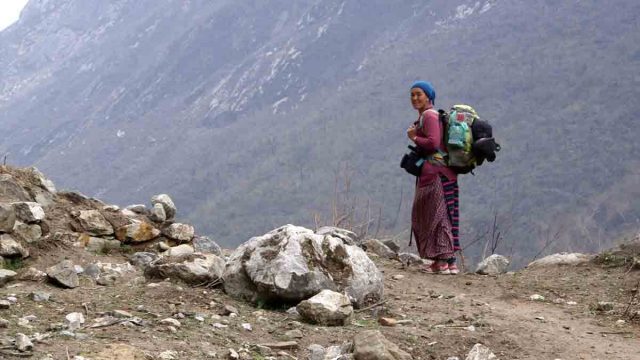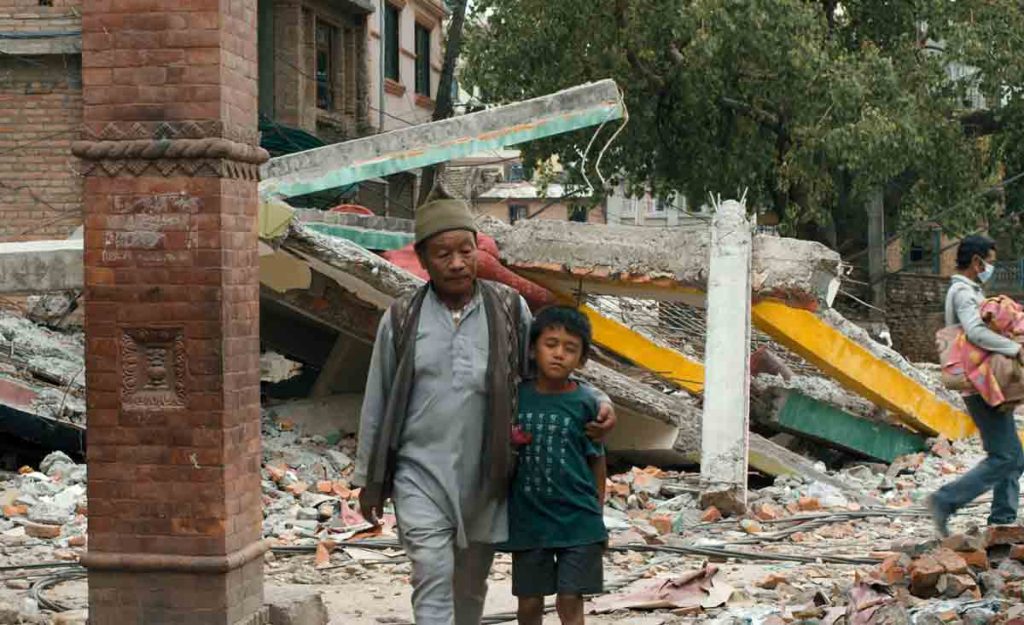When Asmita Shrish and Fateme Ahmadi first began working on what would become Chandra, a short film about a young boy and his grandfather, their original storyline was completely different from what they had first envisioned.
The 2015 Nepal earthquake forced the duo to rethink the story they wanted to tell.
“We were in Nepal preparing to shoot a different script,” Ahmadi explained. “The new script became the film now known as Chandra and is based on our own intense experience during that time.”
The need for a change in scripts quickly became apparent as they began planning the filming process. Many of their scheduled locations had been heavily damaged, and their crew had been emotionally devastated by the 7.8-magnitude quake.
“We [realized we could either] mourn about the devastation or do something that would document the trauma,” Shrish said. She and Ahmadi quickly decided to do the latter.
Chandra is one of five films screening this month in Tricycle’s Buddhist Shorts Film Festival. From exploring what it means to embrace creativity in a fraught political climate to finding new meaning through art during challenging times, these directors are investigating themes of faith through film.

“I guess Chandra was an inevitable and organic reaction to the situation we happened to experience back then,” Ahmadi said.
In the film, Chandra and his grandfather make the journey from their rural village through the earthquake-ravaged country to Kathmandu, Nepal’s capital, where Chandra’s mother has just given birth. The two filmmakers said they tried to weave in allusions to the four noble truths throughout their script, drawing parallels between the suffering experienced by Chandra and other Nepalis living in a post-earthquake world. Chandra’s grandfather was often emotionally withdrawn and struggled to connect to the child.
“Little Chandra has to face the brutal reality of life in every step he takes, and at one point, he is enlightened by a beautiful encounter with the Buddha at the stupa [a large dome-like structure that contains Buddhist relics],” Ahmadi explained. Though he is only a child, Chandra also discovers the importance of forgiveness and compassion in life.
“To me, Buddhism is about forgiveness and how one learns to forgive after one’s self-realization. Chandra is denied protection from his grandfather from the very beginning, and as he learns about what happened with the earthquake, he slowly comes to terms with the fact that things are not going to be the same,” Shrish said. “He realizes that something bad might have happened to his mother and possibly his unborn sibling. But he waits for his own destiny.”
Director Boonsong Nakphoo, whose film Wandering screened at the Tricycle Film Club in August 2017, believes that the complexities of Buddhism and the questions it raises enrich his art. Wandering was a critical favorite and was on the shortlist to represent Thailand in the Best Foreign Film category at the 2016 Oscars.
Wandering tells the story of a Thai villager who begins drinking heavily when it seems like his life is falling apart. He begins to piece things back together after meeting a monk who lived a solitary life in the forest. Nakphoo said he and his crew focused on portraying the isolation of the forest as a key to enlightenment and emotional clarity.
Nakphoo, who draws upon natural elements like wind and water, as well as silence, in his film, believes that watching a good film can be a meditative experience for audiences. But, he added, it was not his role as a filmmaker to explicitly tell viewers what they are meant to take away from the film.
“Everyone can figure out the meaning by themselves based on their way of life,” the Thai filmmaker noted. “They have to walk through the journey themselves.”
Those journeys can be experienced by viewers through documentaries as well as fictional films. Chandra co-director Asmita Shrish has a second film in Tricycle’s festival, the documentary Gyalmu’s House. The film, which is co-directed by Shrish and her close friend Gavin Carver, gives viewers an inside look into the life of Nima Gyalmu, a female sherpa whose home was destroyed during the Nepal earthquake.

Shrish first met Gyalmu when the filmmaker was mountain climbing in 2013. “I was the only girl in the group of 16 men, and I asked for a female porter to accompany me during the trek,” Shrish recalled. She was introduced to Gyalmu by a mutual acquaintance who later died in the earthquake.
“Nima Gyalmu is an extraordinary, strong, and courageous woman,” Shrish recalled. “And funny, too.”
Shrish and Gyalmu would reconnect in 2016 when she and Carver (who is also a mountaineer) went to visit Nepal. They were struck by the efforts and resilience of ordinary Nepalis as they worked to rebuild their lives in the face of enormous loss. When she reunited with Gyalmu, the trekker was grieving the deaths of several family members lost in the earthquake and was working to rebuild her home after it was destroyed by a landslide triggered by the quake.
“The film is a collaboration among Gylamu, my co-director, Gavin, and me,” Shrish said. “This film is about resilience of Nepali people in the aftermath of the earthquake. We wanted to show that Nepal is still a welcoming place, and not ruined, despite the tragedy, unlike [the portrayal in] some media portraits.”
Shrish hopes that as viewers see Gyalmu’s rural community members support each other, they will also think about the larger questions about life and an individual’s role in society.
“Her story is about the strength and courage of a woman who knows that the life is not going to be the same as before,” Shrish said. “But in the process, she comes to terms with her new world in the land of her ancestors.”
Gyalmu’s House and Chandra are both streaming as part of Tricycle’s Buddhist Shorts Film Festival throughout January 2018. These films are free for subscribers. If you’d like to subscribe, you can do so here.
Thank you for subscribing to Tricycle! As a nonprofit, we depend on readers like you to keep Buddhist teachings and practices widely available.
